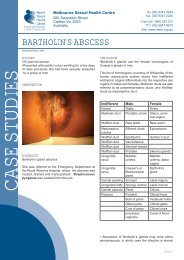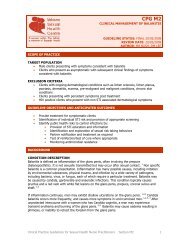What is Mycoplasma genitalium? - Melbourne Sexual Health Centre
What is Mycoplasma genitalium? - Melbourne Sexual Health Centre
What is Mycoplasma genitalium? - Melbourne Sexual Health Centre
Create successful ePaper yourself
Turn your PDF publications into a flip-book with our unique Google optimized e-Paper software.
FOR THE QUEEN, THE LAW, AND THE PEOPLE<br />
<strong>What</strong> <strong>is</strong> <strong>Mycoplasma</strong><br />
<strong>genitalium</strong><br />
<strong>What</strong> <strong>is</strong> <strong>Mycoplasma</strong> <strong>genitalium</strong><br />
MG <strong>is</strong> an infection similar to chlamydia. It <strong>is</strong> spread through sexual contact. It infects the<br />
cervix (neck of the womb) and the central tube of the pen<strong>is</strong> (urethra) in men. It can also<br />
sometimes infect the urethra in women and the throat and anus in both men and women.<br />
Unlike chlamydia we do not know how common MG <strong>is</strong>, although studies indicate it behaves in a<br />
similar fashion to chlamydia and may be nearly as common.<br />
Are there any symptoms of infection<br />
Women: Although less <strong>is</strong> known about MG we suspect, like chlamydia, that a most women<br />
will not have any symptoms at all. When MG does cause symptoms, they are similar to those<br />
caused by chlamydia and can include a vaginal d<strong>is</strong>charge, burning or stinging when passing<br />
urine, pain during sex or lower abdominal pain.<br />
Men: In men the symptoms of MG are also similar to those caused by chlamydia, and include<br />
d<strong>is</strong>charge from the pen<strong>is</strong>, stinging or burning when passing urine or pain in the testicles and<br />
scrotum. However we suspect a signifi cant number of men will not have any symptoms of<br />
infection.<br />
As it <strong>is</strong> likely that many women infected with MG will not have any symptoms, they will not know<br />
they have the infection. Th<strong>is</strong> study will help us determine how many young Australia women<br />
actually catch MG infection during a 12 month period. Th<strong>is</strong> <strong>is</strong> very important information and<br />
we will use it to plan how to control MG infection.<br />
Why are we worried about MG infection<br />
If left untreated, MG infection may cause serious health complications. Preliminary studies<br />
indicate that like chlamydia, MG may cause an infection of the womb (uterus) and fallopian<br />
tubes (that connect the ovaries to the womb), a condition called pelvic infl ammatory d<strong>is</strong>ease<br />
(PID). PID can cause infertility in women (inability to become pregnant). However more<br />
studies are needed to confi rm th<strong>is</strong> association. For men, infection with MG may cause pain and<br />
swelling of the testicles.<br />
Page 1<br />
THE ROYAL<br />
WOMEN’S<br />
HOSPITAL<br />
FAMILY PLANNING VICTORIA<br />
NORTHERN RIVERS<br />
University Department of Rural <strong>Health</strong><br />
C A N B E R R A<br />
H O S P I T A L<br />
A d i v i s i o n o f A C T H e a l t h<br />
NATIONAL CENTRE IN HIV<br />
EPIDEMIOLOGY AND<br />
CLINICAL RESEARCH<br />
CIRIS, School of Population <strong>Health</strong>, University of <strong>Melbourne</strong><br />
580 Swanston Street, Carlton Victoria 3053<br />
Web: www.mshc.org.au/cir<strong>is</strong> Email: cir<strong>is</strong>@mshc.org.au
FOR THE QUEEN, THE LAW, AND THE PEOPLE<br />
<strong>What</strong> <strong>is</strong> <strong>Mycoplasma</strong><br />
<strong>genitalium</strong><br />
How do you catch MG<br />
• MG <strong>is</strong> sexually transmitted, so you can catch it by having sex without a condom with<br />
someone who has the infection.<br />
How do you prevent getting infected with MG<br />
• Use condoms when having sex.<br />
• Get yourself and your partner tested for sexually transmitted infections.<br />
How <strong>is</strong> MG diagnosed<br />
MG <strong>is</strong> easily tested with a simple urine test.<br />
Can MG be cured<br />
MG <strong>is</strong> easily treated. Usually just a single dose of the antibiotic azithromycin <strong>is</strong> used. However<br />
in a number of cases th<strong>is</strong> may not be suffi cient and another antibiotic may also be required.<br />
In order to be sure we have cured the MG, we will ask all women to provide a second urine<br />
sample one month following treatment to be tested again for MG.<br />
Page 2<br />
THE ROYAL<br />
WOMEN’S<br />
HOSPITAL<br />
FAMILY PLANNING VICTORIA<br />
NORTHERN RIVERS<br />
University Department of Rural <strong>Health</strong><br />
C A N B E R R A<br />
H O S P I T A L<br />
A d i v i s i o n o f A C T H e a l t h<br />
NATIONAL CENTRE IN HIV<br />
EPIDEMIOLOGY AND<br />
CLINICAL RESEARCH<br />
CIRIS, School of Population <strong>Health</strong>, University of <strong>Melbourne</strong><br />
580 Swanston Street, Carlton Victoria 3053<br />
Web: www.mshc.org.au/cir<strong>is</strong> Email: cir<strong>is</strong>@mshc.org.au
















